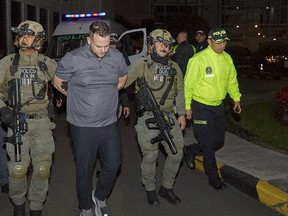The case has dominated national newspapers, broadcasts and social media for more than a week

BOGOTÁ, Colombia – The homeless man was sifting through the garbage bin items he might recycle.
What he found instead was a corpse.
From our newsroom to your inbox at noon, the latest headlines, stories, opinion and photos from the Toronto Sun.
Thanks for signing up!
A welcome email is on its way. If you don't see it, please check your junk folder.
The next issue of Your Midday Sun will soon be in your inbox.
Valentina Trespalacios’s legs had been carefully folded so her body could fit inside a blue rolling suitcase. The luggage was wrapped in black tape. Her head protruded from an opening.
The disappearance, death and discovery of the 21-year-old, a DJ here, has riveted even this nation, where the killing of women has become wearyingly familiar. That might be at least in part due to the identity of the man accused in her death: her American boyfriend.
Colombia authorities have charged John Nelson Poulos, 35, with femicide and concealing evidence. He has pleaded not guilty. If convicted, he could be sentenced to up to 40 years in prison.
The case has dominated national newspapers, broadcasts and social media for more than a week. Femicide, the killing of a woman or girl for her gender, has been a crime in Colombia since the passage of the Rosa Elvira Cely law in 2015. Cely, 35, a single mother who was raped and killed by an acquaintance in a Bogotá park in 2012, has become a national symbol of gender-based violence.
The independent Colombian Femicide Observatory recorded nearly 600 deaths in 2022, or 1.6 per day. Advocates for women here say authorities have responded inadequately to the problem generally, and to the Trespalacios case specifically.
“It is sexist language that leads to the question: What did the victim do to provoke her aggressor?” she said. “The attorney general’s office should show more discretion, more respect toward the victims.”
Defense attorneys have expressed concern about Poulos’s right to the presumption of innocence. On his arrest, he was put in purple handcuffs – a symbol, police said, of “justice in favor of women.”
“The purple color dismisses the presumption of innocence that can only be lost in trial,” said Marlon Díaz, a defense attorney who is not involved in the case. “It is also a feminist fight’s symbol that does not belong to the police.”
Mariana Botero is coordinator of Rosario University’s law clinic on gender-based violence. Even after the passage of Cely’s law, she said, fighting femicide here remains a challenge.
“We have the norms, but there are plenty of judicial officers who still call us ‘exaggerated,'” she said. “This is a weak state that normally reacts only to well publicized cases, while others remain forgotten.”
Indeed, the investigation, arrest and prosecution of Poulos have advanced more quickly than Colombians have come to expect from their criminal justice system. Trespalacios’s friends and family reported her disappearance on social media on the morning of Jan. 22. Within 12 hours, her body had been found and her family notified.
Investigators say surveillance footage taken at the building where Trespalacios and Poulos were staying that day shows Poulos leaving with a suitcase in a shopping cart covered in what appears to be a blanket. The Wisconsin native appears to struggle with the weight of the luggage as he stows it in the trunk of a rented vehicle. Records show he then caught a flight to Panama.
Trespalacios’s cellphone was found at Bogotá’s El Dorado International Airport. Her body was found some two miles away.
On Jan. 24, two days after Trespalacios’s body was found, an Interpol alert enabled authorities in Panama City to arrest Poulos before he boarded a flight to Istanbul. Colombian officials traveled to Panama to bring him back on a twin-engine police aircraft.
Trespalacios’s friends and family have told investigators that the couple had a yearlong long-distance relationship, police records show. They met around four times in Mexico and Colombia before moving in together Jan. 20.
Trespalacios’s friend María Silvana Núñez told investigators they met in a video conference the day before her friend’s body was found, records show.
“Look how messy he is,” Trespalacios told Núñez, the records show. Núñez pointed out his clothes scattered on the bed and asked why he had brought so little if he planned to remain in Colombia. Investigators say Poulos did not take a lease but rented an Airbnb apartment and a car for four days.
The prosecution has been hampered by language. Under Colombian law, foreigners must be given translators to assist them in their defense. Poulos said in court that he had been denied that right.
Before Poulos’s appearance Tuesday, his lawyer surprised the court by removing himself from the case. Martin Riascos said he had been threatened – he didn’t say by whom – and would not continue representing Poulos. The state-provided translator resigned, too.
Poulos told the judge that he had been asking for a lawyer since he was arrested but had been limited by language. An assistant to Riascos was the only English speaker he could find, he said – that’s how he became his attorney.
In court Wednesday, Poulos had a public defender and a new translator.
The judge reminded him he’s entitled to a public defender and can pick a translator, too.


